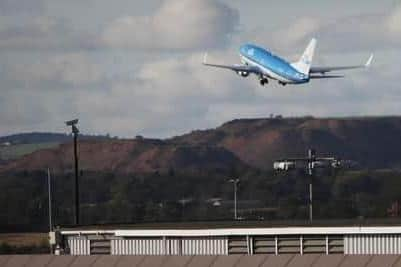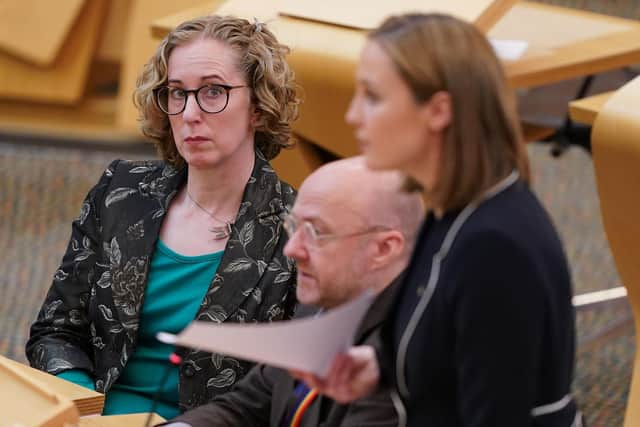SNP-Greens ministers planning new Scottish air travel tax to cut emissions after climate target ditched
SNP and Green ministers will ramp up plans to hike the price of domestic flights by using taxation to push people away from air travel and onto trains.
The Scottish Government has long-resisted calls to cut emissions from aviation in response to the climate crisis and still officially supports the proposed expansion of Heathrow Airport.
Advertisement
Hide AdAdvertisement
Hide AdBut in response to being forced to scrap its key legal climate target of cutting 1990 levels of emissions by 75 per cent by 2030, SNP ministers are drawing up plans to use a devolved tax that is yet to be rolled out to potentially price people out of aviation travel.


The Scottish Government has previously toyed with bringing forward plans to replace air passenger duty, a tax on all eligible passengers leaving UK airports, with a Scottish air departure tax (ADT). The Scottish Parliament previously legislated for ADT back in 2018, but the plans never made it off the ground due to a disagreement with Westminster over an exemption sought for flights from the Highlands and Islands.
But the taxation is now being looked at with Scotland’s lack of progress on reducing climate emissions in mind and could be used to potentially price people out of flying domestically and choosing more sustainable transport options.
When the plans were previously legislated by MSPs, very little concept of the impact on the climate crisis had been put forward – with a focus placed on the potential economic impact for Scotland if the tax was potentially reduced. Currently, UK-wide air passenger duty for domestic flights ranges from £7 to £78.
But with the UK government expected to change hands, SNP and Green ministers hope Sir Keir Starmer’s incoming Labour government could open the door for the tax to be rolled out.


On Thursday, SNP net zero secretary Mairi McAllan set out that ADT “could and should” make a difference to cutting aviation emissions by being used to persuade people onto trains and buses instead of flights to other parts of the mainland UK such as London.
In its scathing assessment of the Scottish Government’s climate progress last month, the independent Climate Change Committee (CCC) starkly warned that improvements to cutting emissions in “aviation and shipping sectors needs to increase by a factor of nine in the nine years from 2021 to 2030”.
The document warned “there is no strategy for decarbonising aviation in Scotland and no progress in addressing aviation demand growth, with the air departure tax yet to be implemented”. In its recommendations, the CCC said “the air departure tax should be implemented as soon as possible”.
Advertisement
Hide AdAdvertisement
Hide AdIn response to that demand from the CCC, The Scotsman understands SNP ministers will set out the “high-level principles” of air departure tax, including “how it will support emissions reductions” by drawing up detailed plans “as soon as possible”.
The hold-up for ADT being rolled out since it was devolved in the Scotland Act in 2016 has been an exemption for Highlands and Islands airports due to them being classed as lifeline transport assets. An exemption from the Treasury has not been granted, but ministers hope an incoming Labour government at Westminster could help push the tax plans forward.
Asked by The Scotsman about whether the exemption can be resolved, Ms McAllan said: “I hope that something can change.” She added: “I hope that we can work out a credible exemption for the Highlands and Islands that makes sure that they are not adversely affected.
“The commitment that I’m making is to continue to call on the UK to work with us on that.”
Asked if Scotland can hit its 2045 net zero targets with the Conservatives in power at Westminster, Ms McAllan said: “Currently, we will not be able to achieve what we want to achieve with the approach that’s been taken to climate with the incumbent UK government.
“That has been made even worse recently with the up to 9 per cent cut to our capital budget, together with their failure to do something akin to the inflation reduction act [in the United States].”
Pressed over whether a Labour government could push climate progress forward in Scotland, the Cabinet secretary said: “I have been really disappointed by Labour’s approach to this.”
She added: “They have been called out by their own party and Momentum for capitulating to the right-wing. The £28 billion commitment was a bit of a green chute – that’s been scrapped.
Advertisement
Hide AdAdvertisement
Hide Ad“I’m pragmatic, I keep wanting to see progress. I will call on a new UK government, which I think is likely to be Labour, to change their position. But that’s up to them to deliver it.”
But Mike Kane, Labour’s shadow aviation minister, has previously distanced his party from supporting moves to hike aviation prices to cut emissions.
Speaking to the aviation industry in November, Mr Kane said there was “no discussion about demand management”, insisting “that will not be in our manifesto”.
But he did suggest Labour could tweak air passenger duty if it forms the next UK government, branding it a “watercooler tax to dampen demand at Heathrow”.
He added: “I am sure on the horizon we will look at how we allow our regional airports to compete in such an environment where they are disadvantaged at the moment.”
Aviation policy is exempt from the Bute House Agreement between the SNP and the Scottish Greens. The SNP still supports the expansion of Heathrow Airport, seeing the infrastructure as crucial to the economy, whereas the Greens are more keen on encouraging people onto more sustainable methods of transport.
Greens co-leader Patrick Harvie told The Scotsman that ADT could be a key policy to price out people from flying domestically through “demand management”. He said the exemption for the Highlands and Islands “does need to be achieved”, adding it was “a question of political will”.
Mr Harvie said: “ADT, the way we tax aviation, needs to be part of how we reduce aviation emission levels. Far too many people have tried to pretend that something like sustainable aviation fuels can do the job on their own – they can’t.
Advertisement
Hide AdAdvertisement
Hide Ad“We need to reduce emissions from our aviation sector just like every other sector and demand management is going to be a part of how we do that. That’s why the taxation system is relevant.”
A Scottish Government spokesperson said: “Ministers recognise that air departure tax could and should make a contribution to reducing emissions from the aviation sector.
“The Scottish Government continues to explore all options for putting in place air departure tax. This must be done in a way that protects the connectivity of the Highlands and Islands and in particular the lifeline services that people living and working there rely on.
“The Scottish Government’s ambition remains to make Scotland as well-connected as similar nations and regions. That relies on a strong mix of direct international routes and connectivity to global hub airports, including Heathrow.”
A UK government spokesperson said: “The Scottish Government is wholly responsible for the implementation of the air departure tax. The UK government remains fully committed to the devolution of this tax and this was legislated for in the Scotland Act of 2016.
“However, the Scottish Government has deferred its implementation and the UK government has agreed to continue applying an equivalent duty in the meantime.”
Comments
Want to join the conversation? Please or to comment on this article.